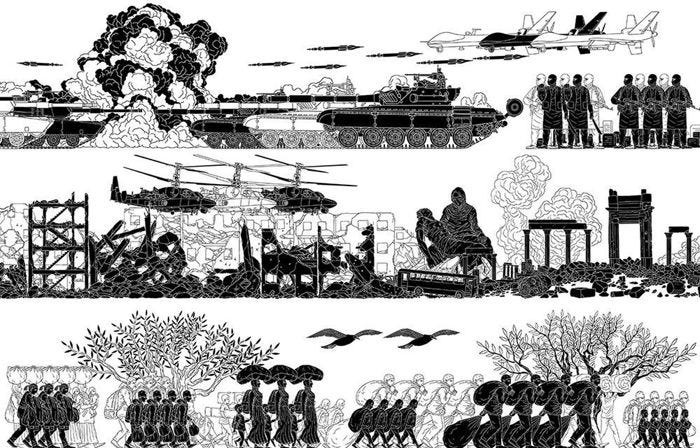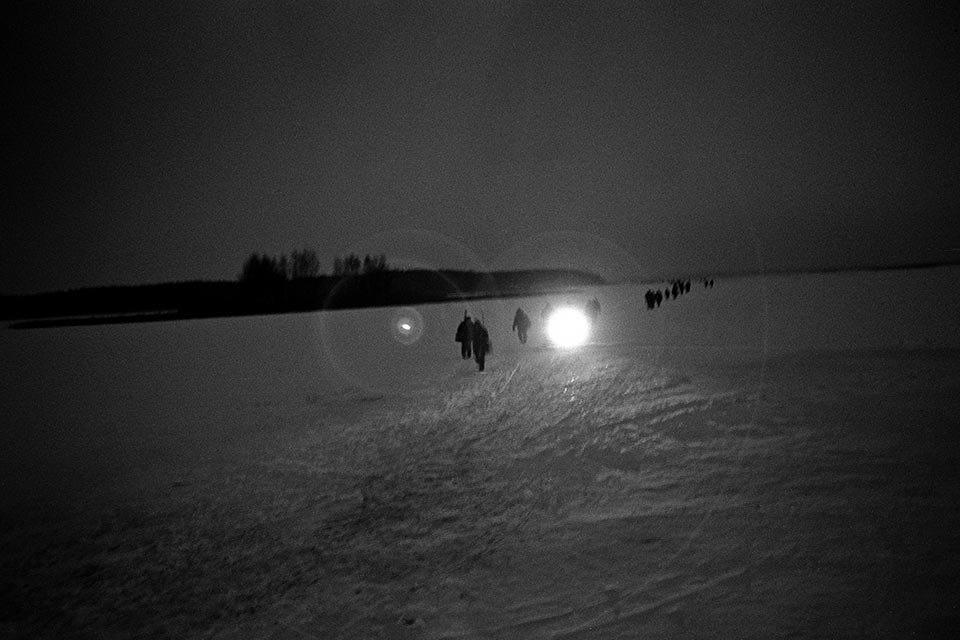[FKPXLS] VOL.36 — In a world that everything counts, everybody matters


"I want better metaphors. I want better stories. I want more openness. I want better questions. All these things feel like they give us tools that are a little more commensurate with the amazing possibilities and the terrible realities that we face."
— Rebecca Solnit

Ai Wei Wei, Odyssey
“Gradually I understand, we don’t have future if we don’t understand the past. It’s like a tree won’t stand on the bare ground, you know. It’s not possible. You have to [be] deeply rooted. Then you can grow.”

Hey beautiful people —
It's easy to feel like we are on the right side of history when we can put a face on the enemy. An epidemic is different. We cannot see it, touch it, or feel the danger. The uneasiness only creeps in when we see the empty bars of New York, the "out-of-stock" note on Amazon, and the continuous growth of deaths on cold screen. There are attempts to find scapegoats, but our baseline sanity soon recognizes that an attack on any party is futile and doesn't yield more toilet paper or bread or jobs.
The calamity illuminates the absurdity of the habits that we were once proud of — it flattens our perceived "uniqueness" and heightens our awareness of our vulnerability and powerlessness. This is everyone's crisis.
The relentless late-night Google searches feel more justified than ever. The last thing we'd want is the unknown, so we eagerly manufacture certainty. Streams of docs, charts, graphs, and data points congregate in Telegram chat groups and impatiently disperse back to the arena of public discourse. Information travels like a rapid river. If we fail to pay attention, we'd be carried to a muddy terrain, with turbid narratives and persuasive numbers. We cling on to the little truths we have to stay afloat. When we pack our bags and leave, it's not the physical space that we're departing from, but we're migrating from a world we once knew. Just like any departure, there are things we can't bring with us — things we have to leave behind.
The rooms that entrap billions of us worldwide are quietly weaving a new reality. There are a few folks who got there before the rest of us, and there are a few who have been travelers and wanderers and now decide to permanently move. The rest doesn’t have a choice — they either can’t move or don’t know how, and it's hard to find them if they didn't make it in time.
The early arrivers are enthusiastic and generous, creating maps and guidebooks that facilitate the acclimation of the migrants. Those who are builders in the new reality feel an unprecedented sense of purpose. The architecture that's been built that's long been vacant is now overcapacity. Families with children and elders are moving in, and the design flaws that slipped their minds became glaringly obvious. They feel like they haven't been able to catch a breath, and they've been fixing things overnight. The idealism that once elevated reality has now become a reality.
The migrants are still exhausted from the journey, and they're already talking about missing the old days. Many of them are at loss, they have no idea how they will fit into this foreign land, where things are made differently. Decades of hard-earned skills become irrelevant until they soon realize that building in this new reality isn't all that inaccessible.
In Chinese, a crisis is spelled as Wei危(danger)-Ji机(crucial occasion, critical point, opportunity). When we are migrating from danger, we are also landing in a new territory that looks like nothing we’ve seen — it’s a simulcast of unprecedented fear and unprecedented unity at scale. The migration is not merely a move towards the world offline or online, world globalist or nationalist, world individuals or institutions, world idealist or pragmatist — it’s not a move between two ends of a set of pre-defined spectrums. Propelled by the force of nature, we’re moving towards an inevitable mode of collective creativity and world-building for our survival. The question comes down to who gets to be a part of the creation story? The answer is everyone.
In the past decade, the design of internet products has brought out the gluttonous and unsatisfied consumers in us. The amount of behavioral data we generate during this time has created some of the wildest inventions that start to demand more and more from us until we forget where we came from. Sometimes, it takes the destruction of the world to unite us. The crisis has heightened our senses of wanting to feel alive, feel safe, feel belonged. Our compassion towards one another and our acts of kindness and courage will become data points that shape the building blocks of this new reality. It’s the generative nature of our existence—as data points—and the technology’s readiness to capture these nuances that will make the recovery from this crisis different.
We once believed that software is a piece of neutral technology, but "software is not neutral. Different software embeds different philosophies, and these philosophies, as they become ubiquitous, become invisible."(Jaron Lanier) The philosophies that we live by from this day on will shape this new reality that was once invisible for most of us. In a world that everything counts, everybody matters. We’re all responsible.
Until next week, stay safe, stay real, say “I love you”—
Tina


Society Centered Design
In the last decades, the concept of human-centered design has made meaningful strides having transformed digital experiences into delightful human-computer interactions. Yet, we soon find out that human-centered designs have their limitations:
20th century approaches like design thinking, human-centered design, and jobs to be done too often look at people solely as individuals. Or, worse yet, only as consumers. They don’t consider people in relation to their communities or to wider society. And society itself is ignored by design.
[…]
We want to move beyond human-centered design to society-centered design. We must design for the collective. We must design for society.
Designing for society means designing for the broader context of systems that we impact and shape. We can redefine our social contract with each other, and with the world that we steward. To do this, we must be intentional about citizen empowerment, civic commons, public health, equity, and the planet…
The COVID crisis will accelerate the inevitable adoption of these principles. One question that arises in my head is: what do we give up this time as we move closer to a more socialist vision.
I found comfort in believing that we will reach a state of synthesis that Will Durant described in The Lessons of History:
Capitalism retains the stimulus of private property, free enterprise, and competition, and produces a rich supply of goods; high taxation, falling heavily upon the upper classes, enables the government to provide for a self-limited population unprecedented services in education, health, and recreation. The fear of capitalism has compelled socialism to widen freedom, and the fear of socialism has compelled capitalism to increase equality.
East is West and West is East, and soon the twain will meet.

📱 Word
Social Distancing
📲 Updated
Distance Socializing / Physical Distancing
Stanford psychologist Jamil Zaki argues that:
“Social distancing” was the wrong term to begin with. We should think of this time as “physical distancing” to emphasize that we can remain socially connected even while being apart.
The WHO independently started using the term “physical distancing” last week.


The CEO of Slack shared the dirty first few days of COVID. The best leadership happens in action. Grateful that Slack and Twitter captured this raw snapshot of strength and vulnerability.

Besides reading Greta’s blood plumping speech “No One Is Too Small to Make a Difference”, I came across a quote from Randolph Bourne (1886 - 1918) on “the spirit of the youth” that has stuck with me for weeks, and the timing can’t be more right:
Youth is the incarnation of reason pitted against the rigidity of tradition. Youth puts the remorseless questions to everything that is old and established-Why? What is this thing good for? And when it gets the mumbled, evasive answers of the defenders it applies its own fresh, clean spirit of reason to institutions, customs, and ideas, and finding them stupid, inane, or poisonous…
[…]
Our elders are always optimistic in their views of the present, pessimistic in their views of the future; youth is pessimistic toward the present and gloriously hopeful for the future. And it is this hope which is the lever of progress--one might say, the only lever of progress... The secret of life is then that this fine youthful spirit shall never be lost. Out of the turbulence of youth should come this fine precipitate — a sane, strong, aggressive spirit of daring and doing. It must be a flexible, growing spirit, with a hospitality to new ideas, and a keen insight into experience. To keep one's reactions warm and true is to have found the secret of perpetual youth, and perpetual youth is salvation.


Chernobyl in Arthur Bondar’s Photographs
It happened ten years ago, and it happens to me again every day.
There you are: a normal person. A little person. You’re just like everyone else — you go to work, you return from work. You get an average salary. Once a year you go on vacation. You’re a normal person! And then one day you’re turned into a Chernobyl person, an animal that everyone’s interested in, and that no one knows anything about. You want to be like everyone else, and now you can’t. People look at you differently. They ask you: Was it scary? How did the station burn? What did you see? And, you know, can you have children? Did your wife leave you? At first we were all turned into animals. The very word “Chernobyl” is like a signal. Everyone turns their head to look. He’s from there!
— Voices from Chernobyl, Svetlana Alexievich
Question
When the future asks us about the past, how would you describe the current situation to them?

📀 The small business owner’s guide to the CARES Act
An easy-to-digest guide to the CARES Act. Share with those in need.
📀Startups will be eligible for coronavirus stimulus loans
VC-backed startups will become eligible for $350 billion in small business loans guaranteed by the federal government.
📀 Startups hiring for during Covid-19 / @jaisajnani
A job board for startups that are still hiring.
A crowdsourced library for technologists, civic organizations, public and private institutions, researchers, and specialists of all kinds working on responses to the pandemic. It is a rapidly evolving resource with thousands of expert contributors.

After taking some time to focus on personal/professional ramp, I’m getting back to building this community to bring together impact-driven thinkers and builders. If you’re interested, reply to this or drop a line.
Thank you to those who have reached out wanting to chat. I’m taking the time to get to know each person better, and I believe in the quality of relationships over quantity.
About Me
Tina is an NYC-based designer, writer, and investor on a mission to empower purpose-driven ventures built by thoughtful makers.



